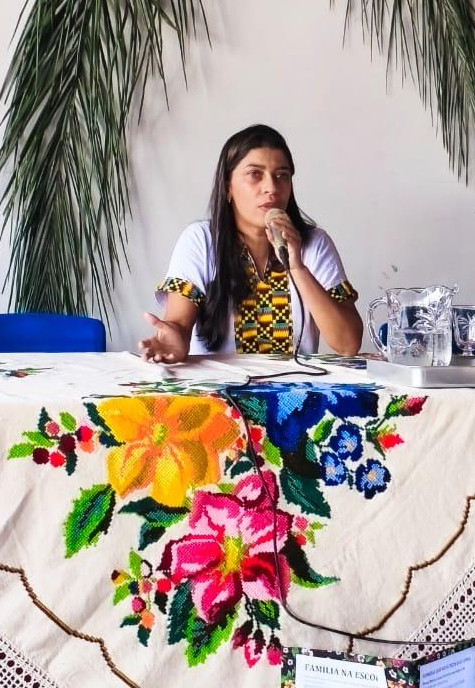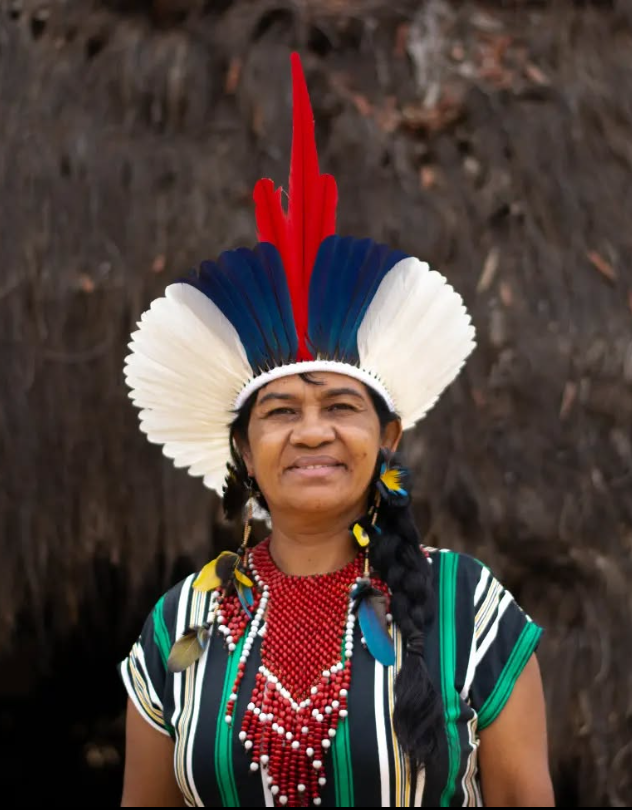
In this dialogue, Cleonice Pankararu Pataxó (Pataxó), leader of the Cinta Vermelha Village, and Ângela Maria Martins Souza (Quilombola), leader of Quilombo Mutuca, speak about their struggle against lithium mining and the defense of their territories in the Jequitinhonha Valley. As a feminine force, radical hospitality comes from women—especially Indigenous and Quilombola women—who welcome and resist simultaneously. They take care of the land, the people, and the memory. Even suffering from exploitation and violence, they continue to make room for others, without losing their strength or their cultures.
Cultural Survival: What is “radical hospitality?”
Cleonice Pankararu Pataxó: Radical hospitality has been a reciprocal practice of Indigenous Peoples and traditional communities for a long time. It’s a resistance, a condition, and an important instrument for us. We have this ability to unite to resist or to divide to resist. Right now, in our territory, we [are hosting] our Xukuru, Kariri, and Aranã relatives. They arrive, we receive them, and they help us in a certain way.

Ângela Souza, photo courtesy of Ângela Souza.
Ângela Souza: From the perspective of the Quilombola community, as a movement, radical hospitality is a political gesture of resistance and affirmation of collective life. Hosting is welcoming without turning the other into a foreigner; it is sharing food, territory, and ancestral memory, reaffirming that the land is a place of encounter, not exclusion. Radical hospitality opposes the colonial and capitalist [ethos] that commodifies hospitality, transforming it into service. Hosting is an act of collective care that strengthens bonds of solidarity and expands networks of resistance in the face of structural racism, patriarchy, and the advance of agribusiness and mining over territories. We have faced the advance of lithium mining since 2020 in the Jequitinhonha Valley and the Mutuca de Cima territory, a Quilombola territory. These enterprises enter with a fallacy of employability, with profits often benefiting foreign companies and investors to the detriment of local communities. Their impact has caused irreversible environmental and social damage. As a network of resistance—radical hospitality within our community—we have carried out projects to fight against the destruction of the environment and against the mining industries that directly affect the Quilombola territory.
CS: How has resistance created alliances between Quilombola and Indigenous communities?

Cleonice Pankararu Pataxó. Photo by Paulo Henrique Figueiredo.
CPP: This action against lithium mining was only possible because we received collaboration and support, like food, publicity material, and support from Indigenous comrades, from Cultural Survival and other institutions representing Quilombas, and even universities. We, Peoples of traditional communities, Indigenous Peoples, people who are excluded, discriminated against, who suffer racism—these practices of colonialism fall on all of us, because our worldview is different. It is a worldview of collectivity, cordiality, and hospitality, which differs from the practices of the colonizer and the explorer. That’s why alliances are very important. We have been making alliances since the invasion of Brazil.
AS: Resistance against mining and other forms of colonialism has strengthened alliances between Quilombola and Indigenous communities, as both face similar threats: the invasion of their territories, environmental destruction, and the violation of their ways of life. These meetings have been configured as spaces of radical hospitality, where welcoming means recognizing in the other an ally in the struggle for land, for good living, and for the safeguarding of ancestral memories. The partnership with Cultural Survival supports projects by Quilombola and Indigenous communities in defense of territorial rights and community management of natural resources.
CS: What changes are essential for these communities to thrive together?
AS: Profound structural changes are necessary. The first is the full guarantee of territorial rights, ensuring that our territories are not violated by mining, agribusiness, or projects that degrade the environment. Strengthening public policies that recognize traditional knowledge, ensure food sovereignty, and promote solidarity economy models that respect our ways of life is essential. Another fundamental change [must be] the political and social recognition that Quilombolas and Indigenous people are guardians of the land and biodiversity, and that their care practices cannot be treated as obstacles, but as viable and necessary alternatives to a sustainable future.
CCP: Our resistance against mining has shown that we must strengthen alliances. Radical hospitality is the basis for resisting and for thriving. It is in reciprocity and collectivity that we can protect ourselves and think about the future.
Top photo by Rebeca Binda.
